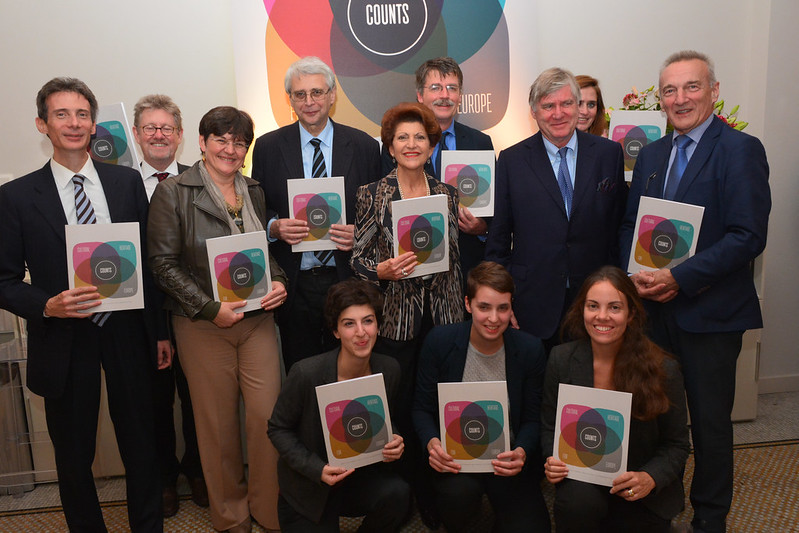Cultural Heritage Counts for Europe book presented
Keeping the momentum for cultural heritage that has been so visible in Europe for the past two years with the adoption of major policy documents by all EU institutions, and most recently by the European Parliament with the adoption on 8 September of the Resolution of the European Parliament “Towards an integrated approach to cultural heritage for Europe”, Europa Nostra and its corporate partner Bertelsmann organised a special networking evening on 22 September 2015 at the Bertelsmann’s Brussels Office dedicated to the presentation of the book with the Cultural Heritage Counts for Europe Report.

The event was attended by former European Commissioner for Education, Culture, Multilingualism and Youth, Androulla Vassiliou, as special guest, as well as by officials of various European Commission Directorate Generals, representatives of the Permanent Representations of EU Member States and Members of the European Heritage Alliance. The directors of the two research partners, Professor Jacek Purchla of the International Cultural Centre in Krakow and Professor Koen Van Baelen of the Raymond Lemaire Centre for Conservation, briefly presented the Full Report ‘Cultural Heritage Counts for Europe’. The Report is the result of a two-year project supported by the Culture Programme of the European Union which provides compelling evidence of the impact of cultural heritage on the economy, society, culture and the environment.
In their presentation, they highlighted some key findings which are particularly relevant for EU policy circles: first, that cultural heritage represents a great potential for return in investment in fields as varied as employment and job creation, regional attractiveness, quality of life, climate change, education, lifelong learning and social cohesion; second, that cultural heritage can become a major driver of sustainable development when policies and investments related to all these fields are well coordinated; and third, that until now this full potential still remains largely untapped.
Following the presentations, former European Commissioner, Androulla Vassiliou, warmly thanked the researchers for producing such an important document, which provides relevant, factual information necessary to substantiate heritage policies across policy fields, thereby contributing to the implementation of a truly integrated approach to cultural heritage at all levels of governance.
Irene Braam, Senior Vice-President Government Relations and Head of the Bertelsmann Brussels Liaison Office, was delighted to host this event. “Bertelsmann is very proud to be the corporate partner of Europa Nostra. We also congratulate the authors of the important book “Cultural Heritage Counts for Europe” to the printing of which Bertelsmann was glad to contribute”.
The holding of this event was particularly timely, one week prior to the debate organised by the Italian and Spanish Permanent Representations on the proposal to establish 2018 as the European Year of Cultural Heritage entitled ‘A European Year of Cultural Heritage: sharing heritage, a common challenge’ (on 28 September 2015) and one month before the European Culture Forum was scheduled to be held by the European Commission (which was unfortunately cancelled due for security reasons).
Background information
The Cultural Heritage Counts for Europe project was carried out between July 2013 and June 2015 with the support of the European Commission and in response to the position paper ‘Towards an EU Strategy for Cultural Heritage — the Case for Research’ presented in 2012 by the European Heritage Alliance 3.3. This project comprised collecting, analysing and consolidating evidence-based research and case studies from different EU Member States on the impact of cultural heritage on the economy, society, culture and environment with three aims: to demonstrate the value and potential of cultural heritage as a strategic resource for a sustainable Europe; to raise public awareness of this resource; and to present strategic recommendations to European decision makers.
The project was coordinated by Europa Nostra through a Steering Group composed of all project partners: ENCATC (The European Network on Cultural Management and Cultural Policy Education), Europa Nostra (The Voice of Cultural Heritage in Europe), Heritage Europe (The European Association of Historic Towns and Regions), The Heritage Alliance from England, UK as well as The International Cultural Centre, Krakow (Poland) and The Raymond Lemaire International Centre for Conservation at the University of Leuven (Belgium) who were responsible for conducting the EU-wide survey and analysis of existing research and case studies on cultural heritage impact assessment.
The outcome of this cooperation is a nearly 300 page report for tapping into heritage’s full potential. It provides compelling evidence of the value of cultural heritage and its impact on Europe’s economy, culture, society and the environment.






